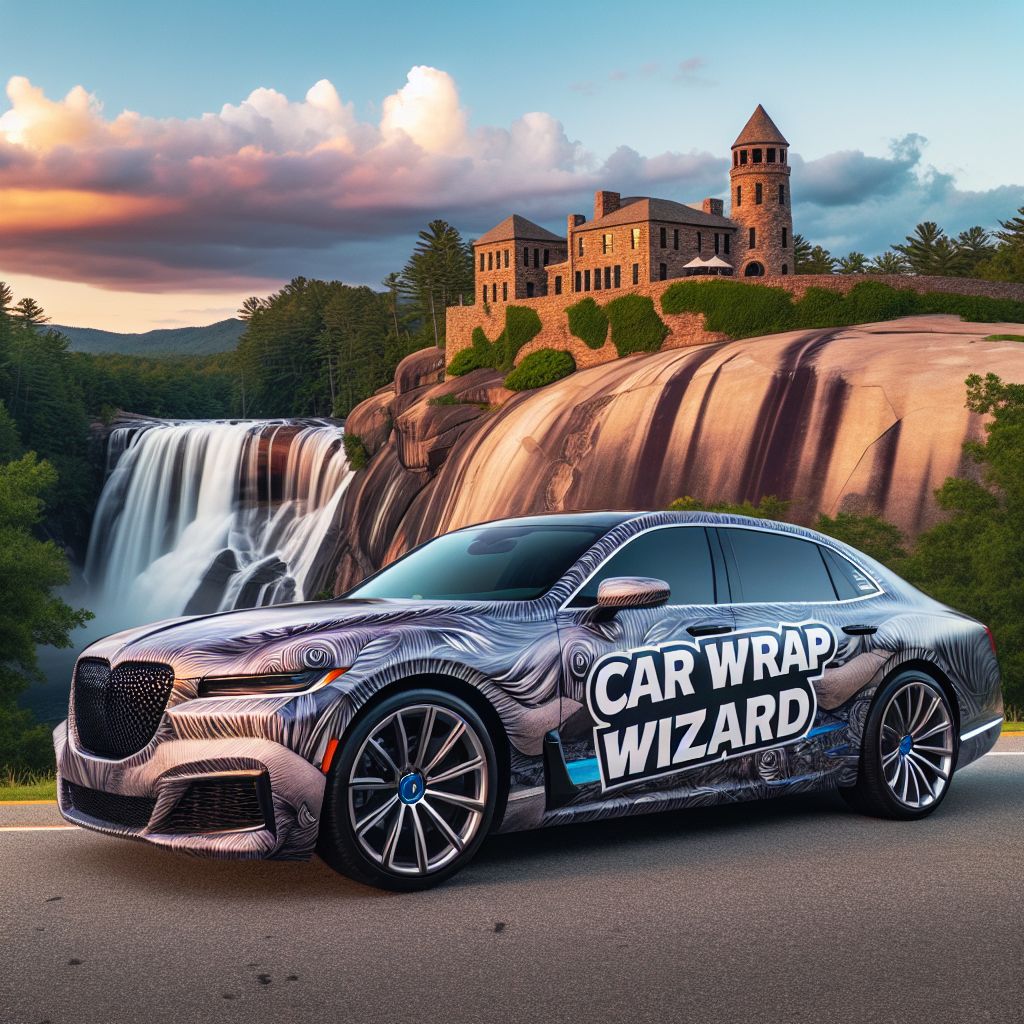
Key Takeaways
- In North Carolina, car wraps are legal, but there are specific guidelines you must follow.
- You must notify the DMV if your car wrap changes the vehicle’s color or reflective properties.
- Using prohibited materials or finishes can lead to legal issues and safety concerns.
- Always inform your insurance company about your car wrap to avoid potential issues with your policy.
- Understanding and adhering to these guidelines will help ensure your car wrap is both legal and stylish.
Understanding Car Wraps: The Basics
Let’s talk car wraps – they’re like a brand-new outfit for your ride. They can give your car a fresh look, protect the original paint, and can even be a moving billboard for your business. But before you jump in, it’s important to know what a car wrap is and why you might want one.
What is a Car Wrap?
A car wrap is a series of vinyl decals that are applied over the paint of your car. They’re designed to cover the entire surface or just specific parts, depending on your preference. Think of them as a second skin for your vehicle. They’re not permanent, so you can change up the look of your car without an expensive paint job.
Benefits of Wrapping Your Vehicle
Why wrap your car? Well, besides looking cool, there are several benefits:
- Protection: Wraps guard your car’s paint against scratches, sun damage, and rust.
- Resale Value: Keeping the original paint intact can help maintain your car’s value.
- Customization: With a wrap, you can choose any color or design, from matte finishes to wild patterns.
- Marketing: If you own a business, a wrap can turn your car into a mobile advertisement, catching eyes wherever you go.
Example: Imagine you have a bright yellow food truck that sells lemonade. Wrapping it with images of lemons and a catchy slogan can draw more attention and customers.
Stay on the Right Side of the Law: Legal Wraps in NC
Now, you might be wondering, “Can I wrap my car any way I want?” Not exactly. There are rules to follow, especially in North Carolina. Let’s dive into what’s legal and what’s not.
Color and Reflectivity: What’s Permitted?
In North Carolina, you’re free to choose almost any color for your wrap, but there are a couple of things to keep in mind:
- The reflectivity of your wrap should not be so high that it blinds other drivers.
- If you change the color of your car, you need to let the DMV know. This helps them keep their records straight, which is important if your car is ever stolen or involved in an accident.
Most importantly, safety should always be your top priority. That means avoiding wraps with reflective properties similar to those of emergency vehicles.
Graphics and Decals: The Boundary of Legality
Graphics and decals are mostly fair game, but you need to steer clear of anything offensive or that imitates law enforcement. That means no fake police badges or emergency service logos unless you want to get into hot water.
So, go ahead and wrap your car in North Carolina, but remember to stick to the rules. Keep it classy, not flashy, and you’ll be just fine.
The Don’ts of Car Wraps: Avoiding Illegal Modifications
Prohibited Materials and Finishes
When it comes to car wraps, not everything that shines is gold, and in North Carolina, certain materials and finishes are off-limits. For instance, chrome or mirror-like finishes can be too reflective, causing safety issues for other drivers. And while matte finishes are generally okay, make sure they’re not so dark that they absorb light like a black hole. Stick to materials that maintain your car’s visibility and you’ll be on the right track.
Visibility Restrictions: Safety Comes First
Safety is the name of the game, and visibility is a major player. If your wrap is too dark or has patterns that could be distracting to other drivers, it’s a no-go. North Carolina law requires that your vehicle be visible from a distance and not be a distraction on the road. So, choose a wrap that makes your car look great without compromising safety.
Remember, the goal is to enhance your vehicle’s aesthetics without creating a safety hazard. This means avoiding wraps that could be mistaken for official vehicles or that could impair the visibility of your car’s lights and windows. For more information, review the vehicle wrap guide for details on coverage options.
Rules of the Road: NC DMV Notification Requirements
Let’s get down to brass tacks. In North Carolina, if you’ve decided to wrap your car, you might need to notify the DMV. Here’s the lowdown:
When to Notify the DMV
If your wrap significantly alters the color of your vehicle, it’s time to give the DMV a heads-up. Why? Because your vehicle registration details need to match your car’s current appearance. It’s not just about being honest; it’s about making sure the records are straight in case of theft or accidents. A quick visit or call to the DMV to update your registration is all it takes.
Impact of Not Notifying: Penalties and Consequences
What happens if you skip the notification? Well, you could be fined, and in the worst-case scenario, your car could be impounded. Plus, if you’re involved in an accident or your car is stolen, mismatched records can lead to headaches with insurance claims or police reports. It’s best to play it safe and keep the DMV in the loop.
Cover Your Bases: Car Wraps and Insurance in North Carolina
Informing Your Insurance Company Is a Must
Just like with the DMV, you’ve got to let your insurance company know about your new wrap. It’s part of your due diligence as a responsible car owner. Your insurance policy may not cover the wrap if they’re not informed, and in the event of damage, you could be out of pocket for the cost of repairs or replacement.
Does a Wrap Affect Your Premium?
It might. Some insurers see wraps as an increased risk, possibly leading to a higher premium. However, others might view it as added protection for your vehicle and not adjust your rates. The key is to communicate with your insurer and find out where they stand. That way, you’re covered, come what may.

Frequently Asked Questions (FAQ)
Can I Wrap My Car Any Color I Want?
Yes, in North Carolina, you have the freedom to choose almost any color for your car wrap. However, there are a few exceptions to keep in mind. For example, you should avoid colors that are typically used by emergency and law enforcement vehicles, as this could cause confusion on the road. Additionally, the reflectivity of the wrap should not be so high that it could impair the visibility of other drivers.
If you decide to change the color of your vehicle with a wrap, it’s important to notify the North Carolina Division of Motor Vehicles (DMV). This ensures that your vehicle registration details remain accurate, which is crucial in the event of an accident or if your vehicle is stolen. A quick update to your registration can save you from a lot of potential trouble down the line.
Do I Need to Update My Vehicle Registration If I Wrap My Car?
When your car wrap significantly changes the color of your vehicle, you are required to update your vehicle registration with the North Carolina DMV. This is because the vehicle’s color is a key identifier in your registration. Failing to update your registration to reflect the new color could result in fines or other legal complications, especially if your vehicle is involved in a law enforcement matter.
Updating your registration is a simple process that can typically be done online, by mail, or in person at a DMV office. This small step is a crucial part of being a responsible vehicle owner and ensures that all your documentation is in order.
Are There Any Restrictions on the Type of Graphics I Can Use?
While car wraps allow for creative freedom, North Carolina does have restrictions on certain types of graphics. Here’s what you need to know:
- Graphics that imitate law enforcement or emergency services are prohibited.
- Offensive or obscene images and language are not allowed.
- Wraps should not obstruct the driver’s view or vehicle’s safety features.
Choosing the right graphics for your car wrap is not just about aesthetics—it’s also about adhering to these legal requirements to avoid penalties.
Example: A business owner decided to wrap their delivery van with a vibrant graphic that included their logo and contact information. They made sure to avoid using any red and blue flashing patterns that could be mistaken for an emergency vehicle, ensuring their wrap was both eye-catching and compliant with state laws.
By understanding these restrictions and choosing your vehicle graphics wisely, you can ensure that your car wrap is both legal and in good taste.
How Does a Car Wrap Affect My Vehicle’s Resale Value?
A car wrap can have varying effects on your vehicle’s resale value. On one hand, a wrap can protect the original paint from wear and tear, potentially keeping the car in better condition and maintaining its value. On the other hand, if the wrap is of poor quality or the design is too personalized, it could deter potential buyers or reduce the resale value. For more information on maintaining your vehicle’s wrap, check out this car wrap care and repair guide.
It’s important to consider that while a wrap can be removed, the process should be done carefully to avoid damaging the underlying paint. If you plan to sell your vehicle in the future, opting for a high-quality wrap and a design that would have broad appeal can be beneficial. For more information on maintaining your wrap, check out this car wrap care and repair guide.
Ultimately, the impact on resale value will depend on the buyer’s preferences and the condition of the car once the wrap is removed.
Can a Car Wrap be Considered a Moving Violation?
Typically, a car wrap in itself is not considered a moving violation. However, if the wrap violates North Carolina’s laws regarding visibility, reflectivity, or impersonation of official vehicles, you could be cited for a safety violation. For instance, a wrap that significantly reduces the visibility of your vehicle’s lights or windows could result in a citation.
Moreover, wraps that could be mistaken for official law enforcement could not only lead to citations but also more serious legal consequences. It’s crucial to ensure that your wrap complies with all applicable laws and regulations to avoid these issues.
Being informed and conscientious about the guidelines for car wraps in North Carolina is essential for any vehicle owner considering this modification. By adhering to the legal standards and promptly updating your vehicle registration and insurance information, you can enjoy the benefits of a wrapped car without encountering legal trouble. Remember, a responsible car owner is always in tune with the rules of the road, ensuring their vehicle is both safe and stylish.
In North Carolina, the DMV has specific guidelines regarding car wraps. Vehicle owners often have questions about whether a wrapped vehicle requires a change in the registration details, especially if the wrap significantly alters the car’s appearance. It’s important to understand what types of car wraps are legal and which ones could get you in trouble. For instance, certain reflective wraps could be prohibited. Moreover, if you’re considering a full-color change wrap, you may need to notify the DMV as it could affect the information on your vehicle’s registration. To ensure you’re in compliance with the law, it’s recommended to check the latest DMV guidelines on car wraps.




